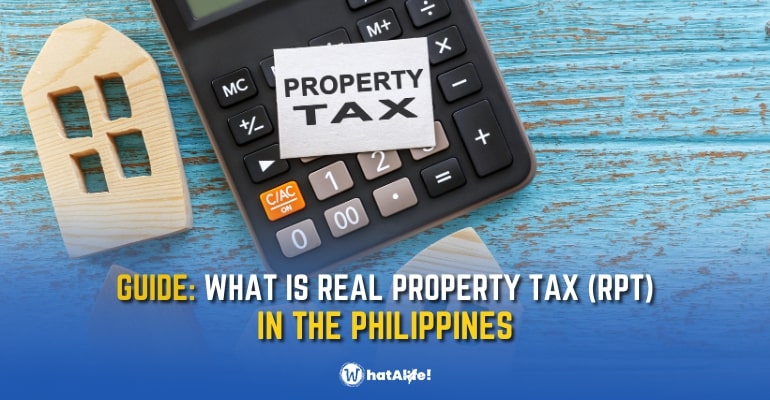Estimated reading time: 5 minutes
As the saying goes, there are only two things certain in life: death and taxes. And for property owners in the Philippines, the latter is a reality that cannot be avoided. Real Property Tax, or RPT for short, is a tax levied by the government on owners of real properties, such as land, buildings, and other improvements. But what is RPT exactly, and how is it calculated?
Table of contents
- What is real property tax (RPT) in the Philippines and why do you need to pay it?
- Who is responsible for paying real property tax in the Philippines?
- The Real Property Taxation System
- Why are properties being taxed?
- Exemptions and Discounts
- When do you pay Real Estate Tax in the Philippines?
- Payment and Penalties
- How to calculate real estate tax in the Philippines?
- Where do you pay real property tax?
- Some Tips to Keep in Mind
What is real property tax (RPT) in the Philippines and why do you need to pay it?
All real property owners are required to pay real property tax each year in the Philippines. Other payment options include quarterly installments. RPT is a tax that the local government body imposes or collects in accordance with the Local Government Code, specifically the 1991 Republic Act 7160.
This law gives the relevant local government unit the authority to produce its own income. Profits from the aforementioned funds are used for public projects like building local water supply sources or schools.
Who is responsible for paying real property tax in the Philippines?
The property owner is generally responsible for paying the real property tax. This applies to both residential and commercial properties in the Philippines.
If you own a property, you are responsible for paying the property tax even if you have a mortgage. However, in some cases, your mortgage lender may collect a portion of the property tax from you as part of your monthly mortgage payment and then pay the tax on your behalf.
It’s important to note that if you are renting a property, you are not typically responsible for paying the property tax. Instead, it is the responsibility of the property owner or landlord to pay the tax.
The Real Property Taxation System
The RPT is imposed based on the value of the property as determined by the LGU. The LGU is authorized to set its own assessment level, which may range from 10% to 100% of the market value of the property. The market value, in turn, is determined by the LGU assessor, who conducts a periodic property assessment.
Under the Philippine Constitution, the RPT must be just, equitable, and uniform. It must also be progressive, which means that the tax burden should be proportionate to the property’s value. The tax rate may vary depending on the property’s classification, such as residential, commercial, industrial, or agricultural.
Why are properties being taxed?
Properties are taxed to generate revenue for the government to fund public services and infrastructure such as schools, roads, public transportation, public safety, and other essential services. Real property tax is one of the primary sources of revenue for local governments in the Philippines and is used to fund a wide range of services that benefit the community.
The amount of property tax paid by property owners is based on the assessed value of the property and the local tax rate. The assessed value is typically determined by a local government assessor or appraiser, and the local government sets the tax rate.
Exemptions and Discounts
Certain properties are exempted from RPT, such as public schools, hospitals, and churches, as well as properties owned by the government or its instrumentalities. Senior citizens and persons with disabilities are also entitled to a discount on their RPT payment.
When do you pay Real Estate Tax in the Philippines?
The payment must be made at the end of January if you want to settle your account for an entire year. The payment will be made quarterly on the last day of the following quarter if you want to pay in quarterly installments:
- First quarter: On or before January 31, annually
- Second quarter: On or before June 30
- Third quarter: On or before September 30
- Fourth quarter: On or before December 31
Payment and Penalties
The RPT payment is due on or before the last day of January of each year. Failure to pay on time will result in penalties, which may include an interest charge of 2% per month or a surcharge of 25% of the tax due, whichever is higher. The LGU may also initiate legal action to collect unpaid taxes.
The LGU may also enforce a tax foreclosure, which allows it to sell the property at a public auction to recover the unpaid taxes. The proceeds from the sale will be used to settle the outstanding tax obligation, and any excess amount will be returned to the property owner.
How to calculate real estate tax in the Philippines?
Identifying the residential or commercial property’s location is the initial step in calculating real property taxes. For instance, RPT rates are 2% in Metro Manila and 1% in the regions.
The formula for calculating real estate tax is Real Estate Income Tax = Real Estate Rate X Assessed Value, where the assessed value of a property is determined by multiplying the fair market value by the assessed value established by ordinances. Its taxable value establishes the appraised value.
The market price must be multiplied by the asset’s worth to get the value of the property.
Where do you pay real property tax?
Real property tax is typically paid to the local government where the property is located. The specific agency or department responsible for collecting property tax may vary depending on the jurisdiction, but it is usually the county or city treasurer’s office, tax assessor’s office, or tax collector’s office.
Property owners may receive a bill for their property tax from the local government each year, or they may be able to access the information online. Some jurisdictions may also allow property owners to pay their property tax online or by mail.
Some Tips to Keep in Mind
If you own a property in the Philippines, it’s important to understand your responsibility for paying property tax and to pay it on time to avoid penalties and interest charges. When buying a property, it’s important to factor property tax into your budget and consider the potential tax implications of different properties.
Overall, understanding real property tax is an important part of property ownership and can help ensure that you are fulfilling your tax obligations while also benefiting from the essential services and infrastructure that property tax supports. –WhatALife!/Jayve
Also read: GUIDE: 2023 Withholding Tax Table in the Philippines



Leave a Reply